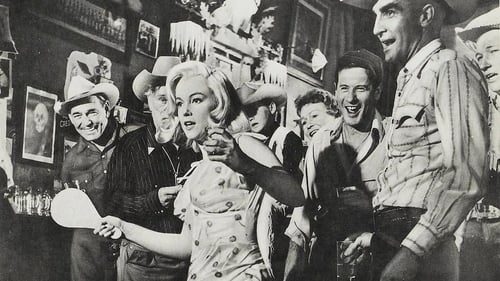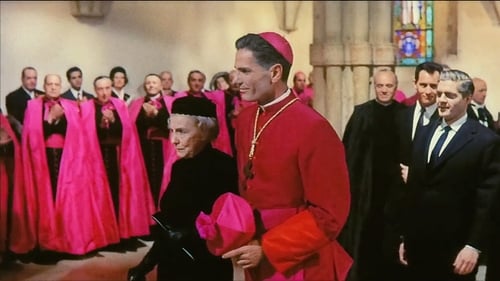Mardi Gras Carnival (1898)
Género :
Tiempo de ejecución : 2M
Sinopsis
The film is part of Eye Filmmuseum’s Mutoscope and Biograph Collection. This collection consists of about 200 films preserved on their original 68 mm format. The digital file provided is scanned in 2022 at Eye Collection Center, from the 35 mm duplicate negative that was made in 1998. After the first analogue preservation round made 25 years ago, Eye is now undertaking the digital restoration of the Mutoscope & Biograph Collection. “Mardi Gras Carnival” became the focus of attention, thanks to its inclusion within ‘The Artistry of REX’ exhibition, that opened in the summer of 2022 at the Louisiana State Museum.

Una joven, que llega a Reno (Nevada) para divorciarse, conoce a un viejo vaquero y decide quedarse unos días en su cabaña. Poco después él descubre en las montañas una manada de caballos salvajes. Con la colaboración de un vaquero especialista en rodeos, decide capturarlos para vender la carne.

Edad Media, siglo XII. Inspirada en el relato homónimo de Edgar Allan Poe (1809-1849). Mientras una plaga devastadora -conocida como la Muerte Roja- diezma la población de una pequeña provincia italiana, el sádico y excéntrico príncipe Próspero se encierra con sus amigos en una de sus propiedades fortificadas para evitar el contagio. Para evadirse de la tragedia, decide organizar una fiesta de máscaras, en la que somete a los invitados a todo tipo de juegos depravados, de los que sólo podrán salir indemnes dos inocentes.

Un sacerdote de Boston comienza a ascender en la jerarquía eclesiástica. Sin embargo, tendra que superar situaciones muy delicadas y peligrosas, como cuando se enfrenta a los nazis en Austria.

Una juicio da un giro sorprendente cuando Edward Weldom, presidente del jurado, tiene que dar el voto decisivo en un caso que podría significar la muerte para una joven juzgada por asesinato. La decisión que toma causa un gran revuelo en la prensa. A pesar de sufrir todo tipo de presiones por parte de los periodistas, Edward se mantiene firme y declara que si las circunstancias fueran otras, incluso si se tratase de un miembro de su propia familia, su voto sería exactamente el mismo. Sin embargo, no sospecha que poco después su hija Stella pasará a ser el centro de atención por un caso similar, aunque en esta ocasión se trate del asesinato de un gangster...

Un obrero ejemplar es enterrado con su carnet laboral en reconocimiento a sus méritos, pero su viuda no puede cobrar la pensión sin ese documento. El sobrino del difunto vive alucinantes aventuras para recuperar el carnet de la tumba de su tío. "Un golpe de ataúd en tierra es algo perfectamente serio", escribió Antonio Machado, y lo es siempre que el cadáver no arrastre consigo sus documentos de identidad en medio de un remolino burocrático, porque entonces se desata el absurdo. Esta película es una sátira social que disfruta denunciando un viejo mal, sus consecuencias y derivaciones, con el desenfado que caracteriza el humor criollo y caribeño. (FILMAFFINITY)

Interview with Jason Holliday aka Aaron Payne. House-boy, would-be cabaret performer, and self-proclaimed hustler giving one man's gin-soaked, pill-popped view of what it was like to be coloured and gay in 1960s Unites States. Preserved by the Academy Film Archive in 2013.

The film explains the French Revolution of 1848. Bernard Blier's narration is supported by pictures once drawn by contemporary artists including Honoré Daumier. Preserved by the Academy Film Archive in 2010.

Touching story of elderly couple David and Eva who go on one last journey across the USA when they discover Eva is dying, ending up with their granddaughter Jeannie in San Francisco. Restored in 2022 by the Academy Film Archive and The Film Foundation. Restoration funding provided by the Hobson/Lucas Family Foundation.

Adaptation of a Strindberg play by Lee Grant for the 1974 AFI Directing Workshop for Women. Restored in 2022 by the Academy Film Archive and The Film Foundation. Restoration funding provided by the Hobson/Lucas Family Foundation.

A bored insurance salesman quits his job to go into politics. He first starts preaching about how man is greater than he thinks and that man can live forever. He ends up forming his own political party, "The Eternal Man" party. He begins to be referred to as "God". Then he starts having doubts about the eternalness of man. Restored by the Academy Film Archive and The Film Foundation, with funding provided by the Hobson/Lucas Family Foundation.

This film recounts the murder of Vincent Chin, an automotive engineer mistaken as Japanese who was slain by an assembly line worker who blamed him for the competition by the Japanese auto makers that were threatening his job. It then recounts how that murderer escaped justice in the court system. Restored by the Academy Film Archive and The Film Foundation, in association with the Museum of Chinese in America. Restoration funding provided by the Hobson/Lucas Family Foundation, with additional support provided by Todd Phillips.

A young woman in a photography class begins taking pictures of black men out of fear they will soon be extinct. Restored by the Criterion Collection, Janus Films, and the Academy Film Archive. Supervised by Cauleen Smith.

A cowboy helps a pretty young woman find lost gold. Restored by the Academy Film Archive with additional funding from the National Endowment for the Arts.

Experimental short 16mm film directed by Mike Henderson. Preserved by the Academy Film Archive in 2010.

An Oscar-nominated film with no narration showing the Exploratorium (The Palace of Arts and Science) in San Francisco. It shows many of the exhibits and the reaction of visitors to many of these. Preserved by the Academy Film Archive.

A documentary about four African-American comediennes set in 1984. Restored in 2021 by the Academy Film Archive.

Mixing narrative and documentary filming in a unique way the story is autobiographical and is about a date rape dissecting the characters and circumstances around it. Restored in 2022 by the Academy Film Archive and The Film Foundation. Restoration funding provided by the Hobson/Lucas Family Foundation.

A motley cast of characters offer their thoughts on what’s most important in life. Preserved by the Academy Film Archive.

A singular cinematic figure, San Francisco’s Mike Henderson became one of the first independent African-American artists to make inroads into experimental filmmaking in the 1960s. Henderson’s work throughout the 1970s and 1980s, from which this program of 16mm films is culled, thrums with a sociopolitical, humorous sensibility that lends his small-scale, often musically kissed portraits (which he later dubbed “blues cinema”) a personal, artisanal quality. - Film Society of Lincoln Center. Preserved by the Academy Film Archive in 2014.

A singular cinematic figure, San Francisco’s Mike Henderson became one of the first independent African-American artists to make inroads into experimental filmmaking in the 1960s. Henderson’s work throughout the 1970s and 1980s, from which this program of 16mm films is culled, thrums with a sociopolitical, humorous sensibility that lends his small-scale, often musically kissed portraits (which he later dubbed “blues cinema”) a personal, artisanal quality. - Film Society of Lincoln Center. Preserved by the Academy Film Archive in 2016.









